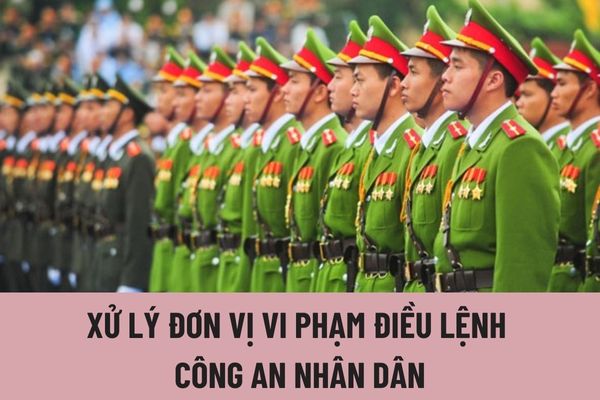What are the Forms of Handling Violations of People's Police Orders by Units? How is the Application of Handling Forms to Violating Units Carried Out?
How many forms of handling violations of the People's Public Security orders are there for units?
Based on Article 7 of Circular 02/2021/TT-BCA, the forms of handling violations of People's Public Security orders for units are as follows:
- Reprimand;
- Downgrade commendation title;
- Do not grant commendation title of the year.

What forms of handling are there for units violating People's Public Security orders? How is the application of forms of handling for units violating orders regulated? (Image from the Internet)
How is the application of forms of handling for units violating orders regulated?
Based on Article 8 of Circular 02/2021/TT-BCA, the application of forms of handling for units violating orders is regulated as follows:
A unit is subject to a reprimand when it commits one of the following acts:
- Failure to comply with the Minister of Public Security's policies on briefings, meetings, conferences, ceremonies, training, competitions; leave policies for officers and soldiers, and the decoration of meeting halls and rooms of the unit;
- Failure to arrange command duty, guard duty, combat duty according to the Minister of Public Security’s regulations;
- Failure to comply with the Minister of Public Security's regulations on hygiene and sanitation of agency headquarters, barracks; hygiene standards for dining, sleeping, resting areas of officers, soldiers; hygiene and sanitation of cultural activity areas, training and competition centers for orders, military exercises, martial arts, physical training; hygiene standards for guest reception areas; fire and explosion prevention and control, disaster prevention, and environmental protection;
- The total number of violations by officers and soldiers in a year accounts for 5% to less than 10% of the unit's personnel.
A unit is subject to downgrade in commendation title for the year when it commits one of the following acts:
- Failure to perform assigned duties;
- Failure to organize briefings; failure to arrange command duty, guard duty, combat duty; failure to create weekly and monthly work programs and plans; failure to organize the regular flag salute;
- Failure to manage documents according to regulations; manage weapons, explosives, support tools, and professional means; manage evidence, vehicles, and temporarily seized items; manage unit assets and means; recover uniforms, badges, rank badges, insignia, cap badges, kepi caps; recover weapons, support tools, professional means, and other work documents;
- The agency or unit headquarters does not fly the national flag as prescribed by law; failure to organize guards or regular protection, no internal protection rules for the agency; no plan or solution for fire control and disaster response. Public service providers within the People's Public Security do not ensure labor safety, industrial hygiene, or environmental protection according to legal regulations;
- During working hours, duty hours, or duty days at the unit, 5% or more officers and soldiers do not wear the People's Public Security uniform or wear it incorrectly (except for cases with specific regulations from the Ministry); setting up altars, placing incense bowls, lighting incense in meeting halls, meeting rooms, guest rooms, working rooms, sleeping quarters, warehouses, communal dining areas, or areas storing documents within the unit's headquarters (except during funeral ceremonies);
- The total number of violations by officers and soldiers in a year accounts for 10% to less than 20% of the unit's personnel.
A unit is not granted the commendation title of the year when it commits one of the following acts:
- Failure to create quarterly, semi-annual, and annual work programs and plans; failure to organize reviews and summaries for major and long-term work themes, semi-annual, and annual reviews;
- Failure to disseminate, organize, or implement directives, orders, decisions, procedures, regulations from higher authorities; concealing or failing to properly handle or address violations of orders;
- Failure to create or implement plans for order, military, and martial arts work; failing to thoroughly understand and promptly follow directives from higher authorities related to orders, military, and martial arts work;
- Using the agency or unit headquarters for unauthorized leasing or borrowing as prescribed by the Ministry of Public Security;
- The total number of violations by officers and soldiers in a year accounts for 20% or more of the unit's personnel.
How are the principles for handling units violating the People's Public Security orders regulated?
Based on Article 3 of Circular 02/2021/TT-BCA, the principles for handling units violating the People's Public Security orders are regulated as follows:
- All violations of orders by units, officers, and soldiers must be handled according to this Circular and other related regulations on the People's Public Security orders.
- Based on the content, nature, level, consequences, causes of the violation, and the unit's or individual's attitude towards remediation, appropriate handling measures should be determined to ensure educational value and preventive measures.
- Ensure a prompt, objective, transparent, democratic, and correct approach to handling the violations, conformable to the Ministry of Public Security's regulations.
- Each violation is addressed only once. In cases of repeated violations of the same type, the handling level is raised by one step compared to the corresponding handling measure for that violation.
At the same violation time:
+ If the violations require different handling measures, apply the higher handling measure one step above the highest handling measure;
+ If the violations require the same handling measure, apply the higher handling measure one step above the corresponding handling measure for one of the violations. In a single case where multiple officers and soldiers violate, each officer and soldier is handled for their own violation according to the nature and extent of their violation.
LawNet